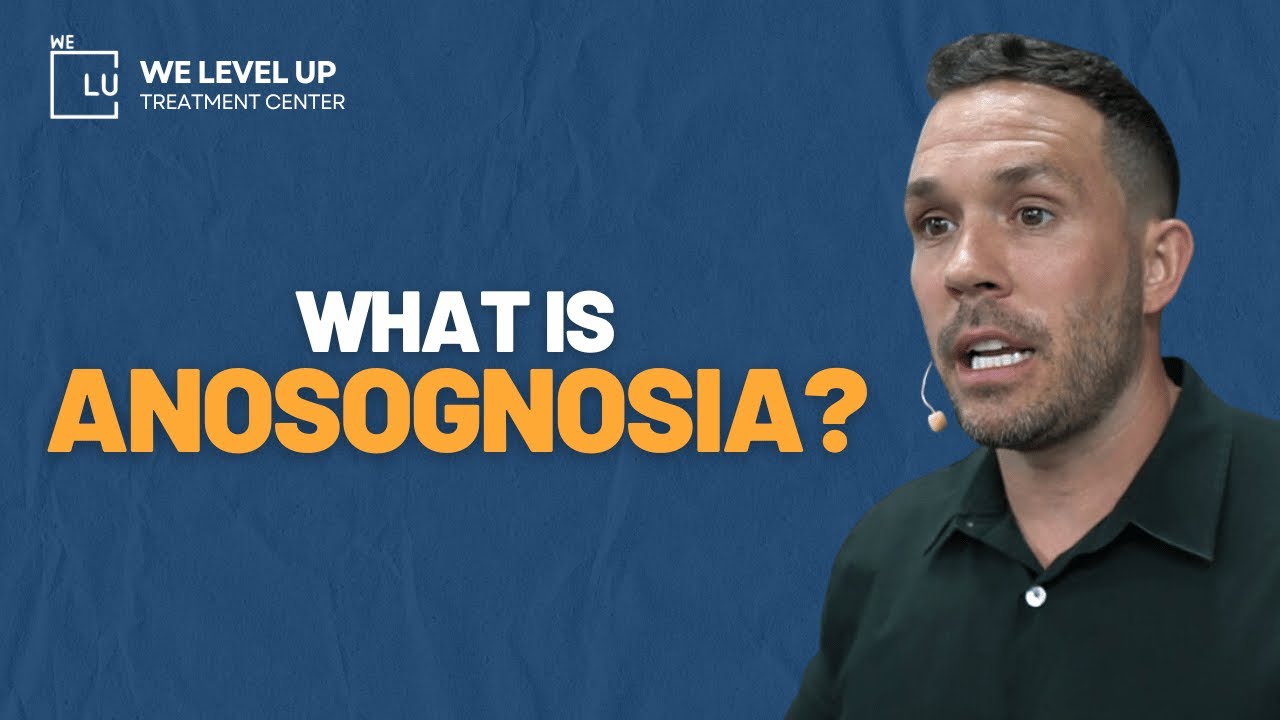Anosognosia is a neuropsychiatric condition where a person is unconsciously in denial and unaware of a noticeable disability. It can occur in both psychiatric and neurologic disorders. According to the National Institutes of Health (NIH), it is linked with mental illness, dementia, and structural brain lesions, as is seen in right hemisphere stroke patients. [1]
We Level Up Texas dual diagnosis treatment center focuses on assisting clients with mental health conditions and addiction. Call us 24/7 for a free consultation.
Anosognosia Definition
Anosognosia is a term from Greek words (a, without; nosos, disease; gnosis, knowledge). It describes an inability to acknowledge or deny a physical deficit or disability.
Anosognosia differs from denial, a psychological defense mechanism that involves avoiding or rejecting information that induces stress or pain. With denial, the patient may accept a deficit, underrate its consequences, and avoid treatments to heal the deficits.
Who’s at Higher Risk of Anosognosia?
While the risk of anosognosia can vary, certain conditions and factors may increase the likelihood of its occurrence. Individuals with the following conditions can be at a higher risk:
- Neurological Disorders:
- Stroke.
- Traumatic brain injury (TBI).
- Alzheimer’s disease.
- Other forms of dementia.
- Psychiatric Disorders:
- Schizophrenia.
- Bipolar disorder.
- Major depressive disorder.
- Other serious mental illnesses.
- Certain Medical Conditions:
- Brain tumors.
- Epilepsy.
- Neurodegenerative diseases.
Anosognosia Symptoms
When someone lacks insight into one’s mental health condition, everyday activities like driving, managing money, and walking independently can become challenging. The symptoms of this condition also include the following:
- Lack of insight.
- Underestimation of symptoms.
- Resistance to treatment.
- Confabulation.
- Inability to recognize limitations.
- Disregard for safety concerns.
- Emotional disconnection.
- Impaired judgment.
- Failure to acknowledge consequences.
- Agitation or irritability.
- Social and occupational impairment.
- Insistence on normalcy.
- Blaming others.
- Unstable awareness.
- Frustration with caregivers.
- Difficulty planning for the future.
What Causes Anosognosia?
The exact causes of anosognosia are complex and can be attributed to various neurological and psychiatric factors. Here are the most common potential causes:
- Brain Lesions.
- Stroke.
- Traumatic Brain Injury (TBI).
- Alzheimer’s Disease.
- Other Dementia Disorders.
- Schizophrenia.
- Bipolar Disorder.
- Major Depressive Disorder.
- Epilepsy.
- Brain Tumors.
- Infection and Inflammation.
- Genetic Factors.
- Medication Side Effects.
- Psychiatric Medications.
- Aging
- Cerebral Hemispheric Asymmetry.
- Neurological Imbalances.
Anosognosia Tests and Diagnosis
Health professionals diagnose anosognosia at the bedside by assessing the patient’s understanding and insight of their symptoms. In subtle cases, it takes time and a long discussion with the patient to uncover anosognosia, as patients may rationalize semi-logical reasons for being unable to conduct activities. In dementia, patients do not recognize or underestimate their memory deficits. In the setting of mental illness, patients rationalize unusual behavior or psychiatric symptoms and often confabulate (i.e., unconsciously fabricate stories to compensate for memory loss). This involves the creation of a false answer or response by combining natural and imagined details.
If you’re struggling with mental health conditions and substance abuse, get resources about treatment counseling today. Start getting support with a free call to our mental health and addiction hotline.
Get Help. Get Better. Get Your Life Back.
Searching for Accredited Drug and Alcohol Rehab Centers Near You? We Level Up Texas Is Opening Soon!
Even if you have failed previously and relapsed, or are in the middle of a difficult crisis, we stand ready to support you. Our trusted behavioral health specialists will not give up on you. When you feel ready or just want someone to speak to about therapy alternatives to change your life call us. Even if we cannot assist you, we will lead you to wherever you can get support. There is no obligation. Call our network hotline today.
FREE Addiction Hotline – Call 24/7How Long Does Anosognosia Last?
When it happens because of a lesion from an injury to your brain, it’s more likely that anosognosia will improve independently. While it may go away in some patients, it’s also possible to be permanent. The lack of insight into one’s mental health condition can be persistent when it happens with mental health conditions or degenerative brain disorders.
Anosognosia Dementia
Anosognosia in dementia is when individuals are unaware or lack insight into their cognitive deficits despite evident impairments in memory, thinking, and other mental functions. This phenomenon is widespread in various forms of dementia, including Alzheimer’s disease and other neurodegenerative conditions.

Dementia’s most common symptoms are:
- Memory Loss.
- Confusion.
- Difficulty Communicating.
- Impaired Judgment.
- Poor Motor Skills.
- Personality Changes.
- Agitation.
- Disorientation.
- Inability to Reason.
- Loss of Initiative.
- Wandering.
- Repetitive Behaviors.
- Hallucinations.
- Delusions.
- Sleep Disturbances.
- Lack of Awareness of Time and Place.
- Challenges with Problem-Solving.
- Difficulty Recognizing Familiar Faces.
- Trouble with Coordination.
- Changes in Appetite and Eating Habits.
Anosognosia Schizophrenia
In schizophrenia, the lack of insight into one’s mental health condition is a common symptom where individuals may not fully recognize the nature of their illness. Insight is crucial because it predicts treatment adherence, relapse frequency, symptom improvement, daily functioning, job attainment, and the risk of self-harm or harm to others.
To recognize schizophrenia, the most common signs and symptoms are:
- Hallucinations.
- Delusions.
- Disorganized Thinking.
- Abnormal Motor Behavior.
- Negative Symptoms (Reduced Emotional Expression, Social Withdrawal).
- Impaired Cognitive Functioning.
- Difficulty Concentrating.
- Memory Impairment.
- Lack of Insight.
- Social and Occupational Dysfunction.
- Emotional Flatness or Inappropriateness.
- Disrupted Sleep Patterns.
- Paranoia.
- Apathy.
- Poor Hygiene and Self-Care.
Anosognosia Bipolar
In bipolar disorder, anosognosia is like a cover that affects how someone perceives their condition. It’s not a deliberate choice but rather a result of changes in the brain. Imagine it as a fog that makes it challenging to see and understand the highs and lows in mood.
How is Anosognosia Treated?
There is no specific treatment for anosognosia, but vestibular stimulation seems to improve this condition temporarily. Vestibular stimulation involves personalized programs that can benefit those experiencing anosognosia, as it helps address problems related to balance and spatial orientation, contributing to an overall improvement in awareness and perception.
Where anosognosia persists, cognitive behavioral therapy can help patients better understand and compensate for their deficits.
It’s crucial to conduct a comprehensive safety assessment for the individual to prevent potential harm. Simplifying tasks, approaching situations with a positive attitude, expressing empathy and concern, and creating a structured environment can all play a key role in preventing adverse outcomes and ensuring the well-being of the person dealing with anosognosia.
There are no specific medications for the management of anosognosia. Because there are many causes and risk factors, the management is with an interprofessional team that includes a neurologist, psychiatrist, mental health nurse, primary care physician, and a psychotherapist.
How to Reduce the Risk of Developing Anosognosia?
Education on how to deal with and help avoid problems related to anosognosia for patients and family members of the patients with this dysfunction is of utter importance, and lack of collaboration from the sufferer is typical due to the patient’s failure to acknowledge or underestimation of their condition.
To reduce the risk of anosognosia for you and your loved one:
- Establish Trusting Relationships.
- Use Positive Communication.
- Involve Supportive Family and Friends.
- Educate about the Condition.
- Encourage Regular Medical Checkups.
- Simplify Information.
- Set Realistic Expectations.
- Be Patient and Understanding.
- Utilize Cognitive Behavioral Strategies.
- Explore Support Groups.
- Foster a Structured Environment.
- Emphasize Consistent Medication Adherence.
- Encourage Routine and Predictability.
- Address Co-occurring Conditions.
- Seek Professional Mental Health Guidance.
If you’re seeking assistance with your rehab journey, reach out to a We Level Up Texas treatment professional today—your call is free and confidential.
Opening Soon! First-Class Facilities & Amenities
World-Class High-Quality Addiction & Mental Health Rehabilitation Treatment
Coming Soon! Rehab Centers TourRenowned Addiction Centers. Serene Private Facilities. Inpatient Rehab Programs Vary.
FREE Addiction Hotline – Call 24/7Proven recovery success experience, backed by a Team with History of:
15+
Years of Unified Experience
100s
5-Star Reviews Across Our Centers
10K
Recovery Success Stories Across Our Network
- Low Patient to Therapist Ratio
- Onsite Medical Detox Center
- Comprehensive Dual-Diagnosis Treatment
- Complimentary Family & Alumni Programs
- Coaching, Recovery & Personal Development Events
We Level Up Texas Dual Diagnosis Inpatient Treatment Center
We Level Up Texas treatment medical team tailors an individualized plan and offers integrated dual diagnosis therapy when needed. Upon arrival, each client undergoes a thorough assessment conducted by our team of physicians, mental health specialists, advisers, and nutritionists to identify underlying issues that had led them to abuse substances.
Our experienced healthcare professionals believe that addressing both underlying issues and addiction enhances the chances of successful, relapse-free recovery. Treating mental health problems related to substance dependency brings individuals closer to long-term sobriety.
Treating Both Mental Health and Substance Abuse
Recognizing a mental health issue is crucial for more effective treatment of concurrent drug addiction. Substance use disorders often begin as a way to cope with self-esteem issues and social status or as a form of self-medication. Some causes are situational, while others may be linked to brain imbalances. Professional guidance is essential to identify underlying conditions, and dual diagnosis treatment usually includes detox and a focused residency program to provide individuals with tools for long-term recovery.
Understanding psychiatric disorders like alcohol use disorder or substance abuse is critical to realizing treatment needs.
Get a free rehab insurance check without any obligation.
Opening Soon! World-class, Accredited, Anticipated 5-Star Reviewed, Effective Addiction & Mental Health Programs. Complete Behavioral Health Inpatient Rehab, Detox plus Co-occuring Disorders Therapy.
FREE Addiction Hotline – Call 24/7End the Addiction Pain. End the Emotional Rollercoaster. Get Your Life Back. Start Drug, Alcohol & Dual Diagnosis Mental Health Treatment Now. Get Free No-obligation Guidance by Substance Abuse Specialists Who Understand Addiction & Mental Health Recovery & Know How to Help.
What is Anosognosia? Symptoms, Lack of Self-Awareness, and How to Help Loved Ones? Informative Video
Start a New Life
Begin with a free call to an addiction & behavioral health treatment advisor. Learn more about our dual-diagnosis programs. The We Level Up treatment center network delivers recovery programs that vary by each treatment facility. Call to learn more.
- Personalized Care
- Caring Accountable Staff
- World-class Amenities
- Licensed & Accredited
- Renowned w/ 100s 5-Star Reviews
We’ll Call You
Search We Level Up Texas Anosognosia Treatment, Detox Topics, and Resources
Sources
- Acharya AB, Sánchez-Manso JC. Anosognosia. [Updated 2023 Apr 24]. In: StatPearls [Internet]. Treasure Island (FL): StatPearls Publishing; 2023 Jan-. Available from: https://www.ncbi.nlm.nih.gov/books/NBK513361/ Related research for anosognosia meaning; definition of anosognosia; define anosognosia; the meaning of anosognosia.
- Mental Health and Substance Use Co-Occurring Disorders – Substance Abuse and Mental Health Services Administration (SAMHSA)
- The Key Substance Use and Mental Health Indicators in the United States: Results from the 2021 National Survey on Drug Use and Health – Substance Abuse and Mental Health Services Administration (SAMHSA)
- Alexander CM, Martyr A, Clare L; IDEAL Programme Research Team. Changes in awareness of the condition in people with mild-to-moderate dementia: Longitudinal findings from the IDEAL cohort. Int J Geriatr Psychiatry. 2022 Mar 4;37(4):10.1002/gps.5702. Doi: 10.1002/gps.5702. Epub ahead of print. PMID: 35294792; PMCID: PMC9314100.
- Ali MF, Ja’afar NIS, Krishnan TG, Zulkifle MAM, Khaidzir NK, Jamil TR, Man ZC, Aziz AFA. Dementia awareness among elderly at risk for developing mild cognitive impairment: a cross-sectional study at a university-based primary care clinic. BMC Geriatr. 2023 Aug 17;23(1):496. Doi: 10.1186/s12877-023-04230-4. PMID: 37592221; PMCID: PMC10436505.
- Lysaker PH, Buck KD, Salvatore G, Popolo R, Dimaggio G. Lack of illness awareness in schizophrenia: conceptualizations, correlates, and treatment approaches. Expert Rev Neurother. 2009 Jul;9(7):1035-43. doi: 10.1586/ern.09.55. PMID: 19589052.
- Gilleen J, Greenwood K, David AS. Domains of awareness in schizophrenia. Schizophr Bull. 2011 Jan;37(1):61-72. Doi: 10.1093/schbul/sbq100. Epub 2010 Sep 17. PMID: 20851850; PMCID: PMC3004192.
- Grover S, Avasthi A, Chakravarty R, Dan A, Chakraborty K, Neogi R, Desousa A, Nayak OP, Praharaj SK, Menon V, Deep R, Bathla M, Subramanyam AA, Nebhinani N, Ghosh P, Lakdawala B, Bhattacharya R. Insight in patients with bipolar disorder: Findings from the bipolar disorder course and outcome study from India (BiD-CoIN study). Indian J Psychiatry. 2023 Jul;65(7):767-773. Doi: 10.4103/indianjpsychiatry.indianjpsychiatry_714_22. Epub 2023 Jul 12. PMID: 37645363; PMCID: PMC10461589. https://www.ncbi.nlm.nih.gov/pmc/articles/PMC10461589/
- Elshebiny A, Almuhanna M, AlRamadan M, Aldawood M, Aljomeah Z. Awareness of Stroke Risk Factors, Warning Signs, and Preventive Behaviour Among Diabetic Patients in Al-Ahsa, Saudi Arabia. Cureus. 2023 Feb 22;15(2):e35337. Doi: 10.7759/cureus.35337. PMID: 36974251; PMCID: PMC10039371.
- Mythri SV, Sanjay Y. Recent Neurobiological Insights into the Concept of Insight in Psychosis. Indian J Psychol Med. 2016 May-Jun;38(3):189-93. Doi: 10.4103/0253-7176.183077. PMID: 27335512; PMCID: PMC4904753.
- Greenhouse WJ, Meyer B, Johnson SL. Coping and medication adherence in bipolar disorder. J Affect Disord. 2000 Sep;59(3):237-41. Doi: 10.1016/s0165-0327(99)00152-4. PMID: 10854641.
- Sevush S, Leve N. Denial of memory deficit in Alzheimer’s disease. Am J Psychiatry. 1993 May;150(5):748-51. Doi: 10.1176/ajp.150.5.748. PMID: 8480820.








